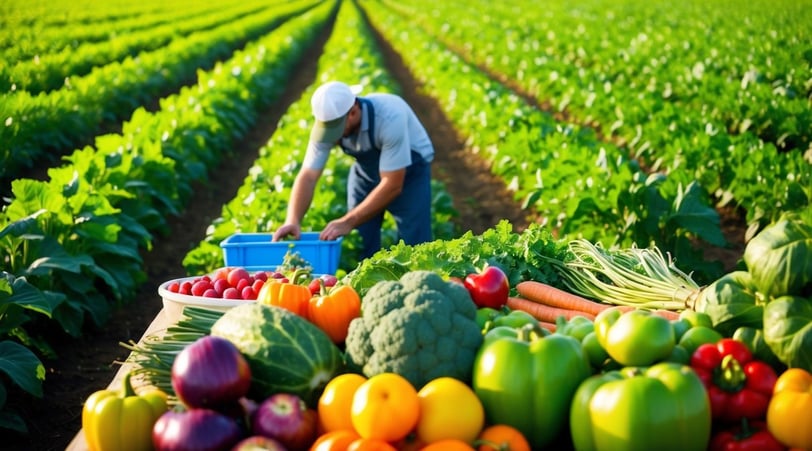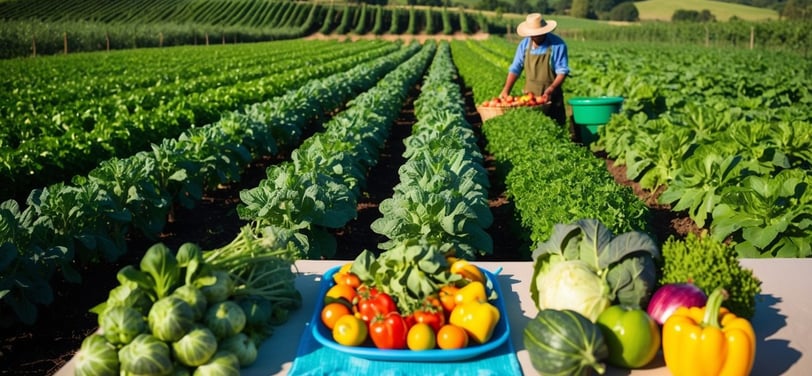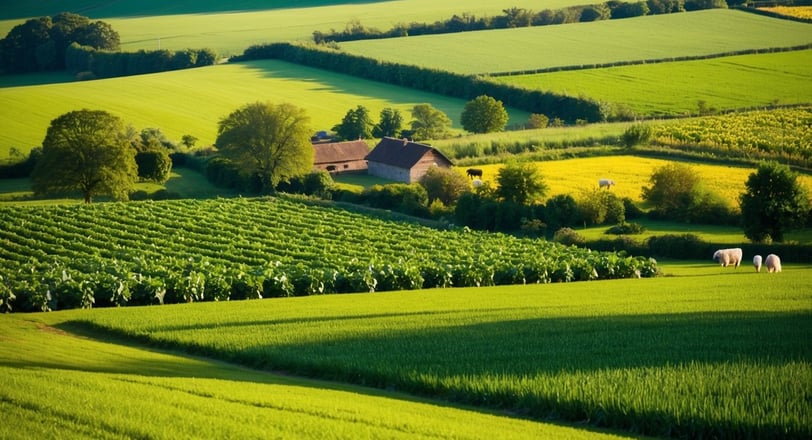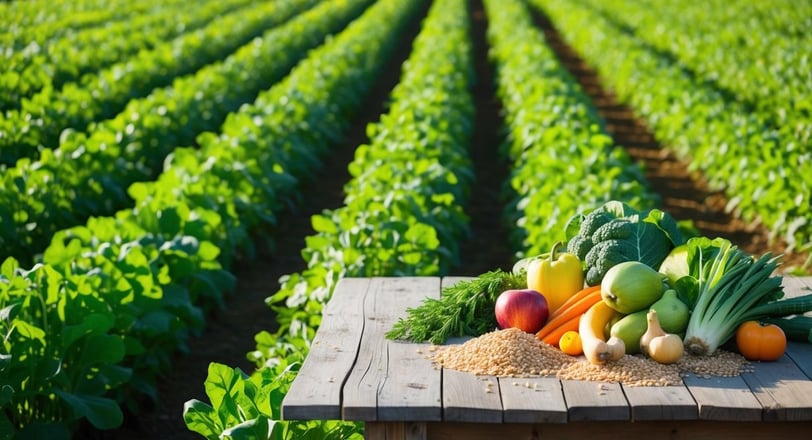Health Benefits of Organic Foods: From Farm to Table - Nourishing Your Body Naturally
Dive into the world of organic foods and their health benefits! Find out how nourishing your body naturally can enhance your well-being from farm to table.
NUTRITION AND DIET
3/20/20257 min read
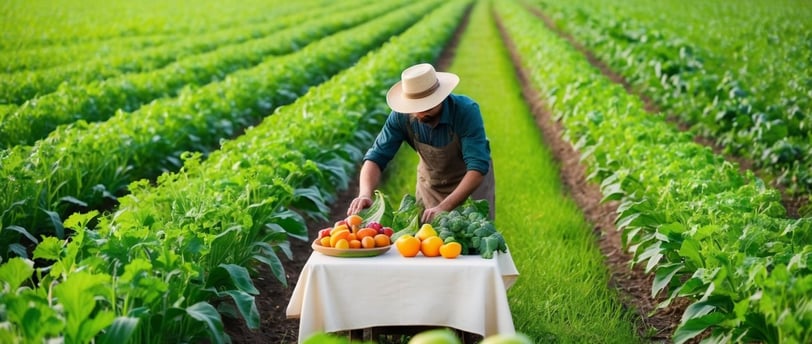

Health Benefits of Organic Foods: From Farm to Table - Nourishing Your Body Naturally
Organic foods have become increasingly popular in recent years, and for good reason. Many people are turning to organic options to avoid pesticides and chemicals in their diet. Organic foods contain fewer pesticides and more nutrients than conventional foods, which may lead to better health outcomes over time.
Have you ever wondered if that extra cost for organic produce is truly worth it? When you choose organic, you're not just making a choice for your health, but also for the environment. I recently switched to organic strawberries and was amazed at how much more flavourful they were compared to the conventional ones I'd been buying for years.
From farm to table, organic foods follow a journey that prioritises natural growing methods and sustainability. This means your Sunday roast veggies might have been grown without synthetic fertilisers, and that free-range organic chicken might have lived a more natural life. You can find brilliant organic options at most supermarkets now, or try the Organic Food Box from Amazon UK for a convenient weekly delivery.
Key Takeaways
Organic foods contain fewer synthetic pesticides and often higher nutrient levels than conventional alternatives.
Choosing organic supports sustainable farming practices that benefit both your health and the environment.
The organic food journey ensures better animal welfare standards and preserves the natural flavour and quality of your food.
Understanding Organic Foods
Organic foods come from farming practices that focus on sustainability and natural processes. They're grown without synthetic pesticides and fertilisers, making them different from conventional foods you might find in supermarkets.
Principles of Organic Farming
Organic farming works with nature rather than against it. Farmers use techniques like crop rotation to keep soil healthy and prevent pest problems. Instead of synthetic chemicals, they rely on natural fertilisers like compost and manure.
I visited a lovely organic farm in Devon last summer where they showed me how they plant different crops each season. This helps the soil stay rich in nutrients and breaks pest cycles naturally.
These farms also promote biodiversity. You'll often see hedgerows, ponds, and wildlife corridors that provide homes for beneficial insects and animals. These creatures help control pests naturally.
Organic farmers focus on soil health above all else. They know that healthy soil grows healthy plants that can fight off disease and pests on their own.
Organic Certification and Standards
For food to be labelled "organic" in the UK, farms must follow strict standards enforced by certification bodies. The Soil Association is the main one you'll see on products.
Getting certified isn't easy or cheap! Farmers must avoid prohibited substances for at least 2-3 years before they can call their produce organic.
The USDA Organic label and EU Organic logo are what you should look for when shopping. These ensure the product contains at least 95% organic ingredients.
I've found some brilliant organic staples on Amazon UK, like Biona Organic Coconut Oil (£8.99) that's perfect for cooking and skincare too!
Certification covers every step from farm to your table. This includes processing, packaging, and transportation to ensure the organic integrity remains intact.
Health Advantages of Organic Consumption
Choosing organic foods can make a real difference to your wellbeing. These naturally grown options offer several health benefits that might surprise you.
Nutritional Benefits of Organic Produce
Organic fruits and vegetables often contain higher levels of important nutrients. Studies show they can have up to 69% more antioxidants than conventionally grown produce. These antioxidants help fight inflammation and protect your cells from damage.
When I switched to organic berries last year, I noticed they tasted more flavourful - turns out that's because they're often more nutrient-rich!
Organic milk and meat products typically contain about 50% more omega-3 fatty acids than non-organic options. These healthy fats support brain function and heart health. You might want to try the Daylesford Organic Whole Milk (£2.50 on Amazon UK) - my family loves its creamy taste.
Organic foods also tend to have higher levels of vitamin C, iron, magnesium and phosphorus. These nutrients help your body function at its best.
Reducing Chemical Exposure
One of the biggest benefits of choosing organic is reducing your exposure to harmful chemicals. Organic farming prohibits the use of synthetic pesticides commonly found in conventional farming.
Conventional produce can contain residues from up to 400 different chemical pesticides. By choosing organic, you can reduce your pesticide exposure by as much as 80%.
Children especially benefit from reduced chemical exposure. Their developing bodies are more vulnerable to pesticide effects. When my nephew started eating organic baby food, his persistent rashes cleared up within weeks!
Chemical Exposure Reduction with Organic Foods:
Less synthetic pesticide residue
No artificial food additives
Fewer heavy metals
No artificial hormones in meat/dairy
Supporting Immune System and Public Health
Organic farming practices promote healthier immune systems both on individual and public health levels.
Organic livestock aren't given routine antibiotics, which helps reduce the spread of antibiotic-resistant bacteria. This is increasingly important as antibiotic resistance becomes a serious public health concern.
Your immune system benefits from the additional antioxidants found in organic foods. These compounds help your body fight off infections and maintain health.
Many people report fewer allergic reactions when switching to organic foods. I've found that organic options like Neal's Yard Remedies Organic Superfood Mix (£18.99 on Amazon UK) have helped boost my energy levels during winter months.
Organic farming also protects farm workers from chemical exposure, creating healthier communities where our food is grown. When you choose organic, you're supporting healthier lifestyles for everyone involved in food production.
Impact on the Environment and Animal Welfare
Choosing organic foods doesn't just benefit your health—it also helps protect our planet and the animals that share it with us. When you buy organic, you're supporting practices that preserve ecosystems and ensure more humane treatment of farm animals.
Promoting Environmental Sustainability
Organic farming works with nature rather than against it. Traditional farms often use chemical pesticides that can harm soil health and contaminate waterways. When you choose organic, you're supporting methods that maintain soil fertility through natural means like crop rotation and composting.
I visited an organic farm in the Cotswolds last summer and was amazed by the diversity of insects and birds thriving there!
Organic practices also help fight climate change. These farms typically release fewer greenhouse gases than conventional operations. The healthy soil on organic farms can actually trap carbon dioxide from the atmosphere—brilliant for combating global warming!
Want to reduce your carbon footprint? Try the Riverford Organic Veg Box delivery service. My family switched last year, and we love the seasonal variety!
Supporting Animal Ethics in Farming
Organic livestock standards ensure animals have better lives. On organic farms, animals must have access to the outdoors and space to express their natural behaviours.
Have you seen those crowded factory farms on the telly? Organic standards prohibit such cramped conditions and require proper bedding and shelter.
Animals on organic farms eat natural, organic feed without artificial additives. They're also raised without routine antibiotics, which helps prevent the development of antibiotic-resistant bacteria—a serious health concern for us all.
Organic certification requires humane handling during transport and slaughter too. When you choose organic meat or dairy, you're voting for kinder treatment of animals with your wallet.
My neighbour switched to organic meat and says she feels better knowing the animals were treated properly!
From Farm to Table: The Organic Food Journey
The organic food journey connects farmers directly with consumers, creating a more sustainable and transparent food system. This process supports local farmers, ensures fresher produce, and builds stronger communities.
The Role of Community-Supported Agriculture
Community-supported agriculture (CSA) programmes create special bonds between you and local organic farmers. When you join a CSA, you pay upfront for a share of the harvest, sharing both risks and rewards with farmers.
Each week, you'll receive a box of seasonal organic vegetables, fruits, and sometimes even eggs or flowers. It's like having your own personal farm without the hard work!
Many CSAs invite members to visit the farm for harvest days or community events. You can see exactly how your food is grown and even help with the picking.
Children particularly benefit from these experiences. My nephew Tom used to refuse vegetables until he joined our local CSA visits—now he proudly eats the carrots he helped harvest!
For quality organic gardening tools, I've found the Spear & Jackson Traditional Stainless Steel Hand Fork (£12.99 on Amazon) brilliant for my community garden work.
Farm-to-Table Philosophy and Practice
The farm-to-table movement focuses on serving food made with locally-sourced ingredients. This approach ensures you're getting the freshest organic produce possible.
When food travels shorter distances, it retains more nutrients and tastes significantly better. Those organic strawberries picked this morning simply can't compare to ones shipped from abroad!
Many restaurants now proudly list their local farm partners on menus. This transparency helps you make informed choices about your food's origins.
Farm-to-table practices also reduce packaging waste and transport emissions. Your dinner's environmental footprint shrinks considerably when ingredients come from just down the road.
You can practice farm-to-table at home by shopping at farmers' markets or growing herbs on your windowsill. Even small steps make a difference!
Boosting Local Economies Through Organic Choices
When you buy organic food locally, your money circulates within your community. Studies show that every £10 spent at a local business generates £50 of local economic activity.
Organic farms typically employ more workers than conventional farms, creating valuable rural jobs. Your purchase helps maintain these employment opportunities.
Local organic farmers often earn fairer wages than those selling to large supermarket chains. You're directly supporting their livelihood with each purchase.
Beyond farmers, your organic purchases support a network of local businesses—from the family-owned shop selling organic milk to the delivery service bringing organic meat to your door.
Many towns have seen remarkable economic revivals through organic food initiatives. In my village, the introduction of a weekly organic market transformed our struggling high street into a bustling hub of activity!
